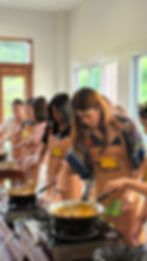How to Get Thailand's DTV Visa Through Cooking Classes?
- Suman Dhar
- Nov 19, 2025
- 4 min read
Updated: Dec 2, 2025

Thailand attracts many people who want to stay longer than a regular tourist visit. The government created the Destination Thailand Visa to make this easier. One way to qualify is through Thai cooking classes. Here's what you need to know about getting a DTV visa in Thailand this way.
What is the DTV Visa?

The DTV visa in Thailand lasts five years and lets you enter multiple times. Each entry gives you 180 days in the country. You can extend your stay too. It's one of the best Thailand long-term visa options available now.
This visa was made for people doing cultural activities, working remotely, or participating in soft power programs. Soft power means things like Muay Thai, meditation, and cooking courses. Thai cooking classes count as a soft power activity.
Why Choose Cooking Classes?
Thai food is known everywhere. A proper cooking program teaches you about Thai culture through food. You also meet the requirements for a DTV visa in Thailand.
You get practical benefits. You learn cooking skills you can use at home. Market visits show you how locals shop and what ingredients they use. Many embassies now accept cooking programs for DTV applications if the courses run weekly over several months.
What Qualifies as a Valid Course?
Not every cooking class works for Thailand's long-term visa options. Embassies have requirements. The program needs at least one class per week. It should run for months, not days. You need official papers from the school. The teaching should cover more than basic recipes.
The course length matters. Most accepted programs run six to twelve months. Classes happen weekly or every two weeks. Embassies check whether you're serious about learning or just trying to get a visa quickly.
Programs at Arun Thai Cooking

We designed our programs based on what embassies want. More than 250 students have used our courses to get their DTV visa in Thailand.
Our 6-month program has 30 classes. You get six cooking workshops, eleven practice sessions, six craft classes for carving and plating, six more practice sessions, and one market tour with tuk-tuk transport. This counts as the best Thai cooking course for people who want proper training while meeting visa rules.
The 12-month program has 60 classes. It includes twelve cooking workshops, twenty-two practice sessions, twelve craft classes, twelve practice sessions, and one market visit. Both programs schedule classes on weekends. You can move classes around within one or two years. We give you all the papers the embassies need.
If you're interested in what makes Thai cooking classes worthwhile beyond just the visa, you can read about why taking a Thai cooking class should be on your Bangkok bucket list.
How to Apply?
Getting your DTV visa in Thailand through our program is simple. Pick a program and pay for it. We send you the Certificate of Enrollment, class schedule, payment receipt, and company papers within two business days. These are what embassies ask for.
You can apply two ways. Most students pick our visa support package. It costs 18,000 THB. Partner experts check your documents, talk to the embassy, and pay the visa fee for you. If your visa gets rejected in the Philippines or Laos, you get everything back.
Or you can apply yourself using our papers. You submit through embassy websites. They usually decide in ten to fourteen business days.
One important thing to know: all DTV applicants must show they have at least 500,000 THB in their bank account. This is a standard requirement that applies no matter which soft power activity you choose.
What Makes Our Program Different?
We work with visa agencies and law firms that handle DTV cases. Our programs follow embassy rules about weekly classes. Students get approved more often because our structure matches what embassies expect.
We just renovated our school. It has good natural light. The location is 100 meters from Itsaraphap MRT station. You learn everything from making curry paste to carving fruit.
Each class explains more than how to cook. We talk about where dishes come from, how they differ by region, and what they mean culturally. Market tours teach you about ingredients and shopping. Craft classes show you how to make food look good. This is what makes the best Thai cooking course different from shorter options.
If Your Visa Gets Rejected
Applying for Thailand long-term visa options costs money. We offer protection. If you apply directly and get rejected, you get 90% back. If you use our visa support package and get rejected, you get 100% of the course fee back. The support package fee also comes back for Philippines or Laos applications.
What You Learn?

The best Thai cooking course teaches more than recipes. You learn to balance five flavors: sweet, sour, salty, bitter, and spicy. You see how Thai geography and history shaped the food. You meet other students and local teachers each week.
You understand ingredients better. You know cooking techniques. Markets become easier to navigate. You notice regional differences in food. You learn about Thai hospitality through food.
Getting Started
Our programs at Arun Thai Cooking work if you want Thailand's long-term visa options through cooking. The six-month program costs 28,900 THB and the twelve-month costs 52,900 THB under our early bird pricing. Both include everything you need.
We welcome all skill levels and can accommodate dietary preferences and food allergies. If you're ready to start your journey, reach out to us and we'll guide you through enrollment and the entire application process. Make your DTV visa in Thailand a reality with the right culinary program.
